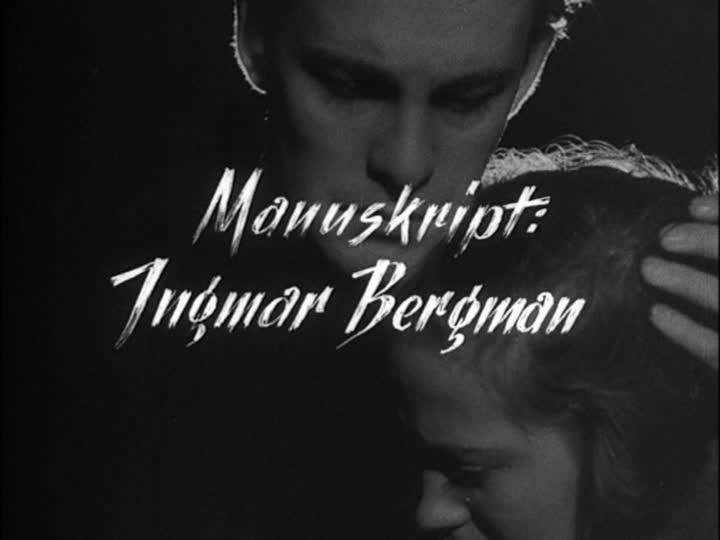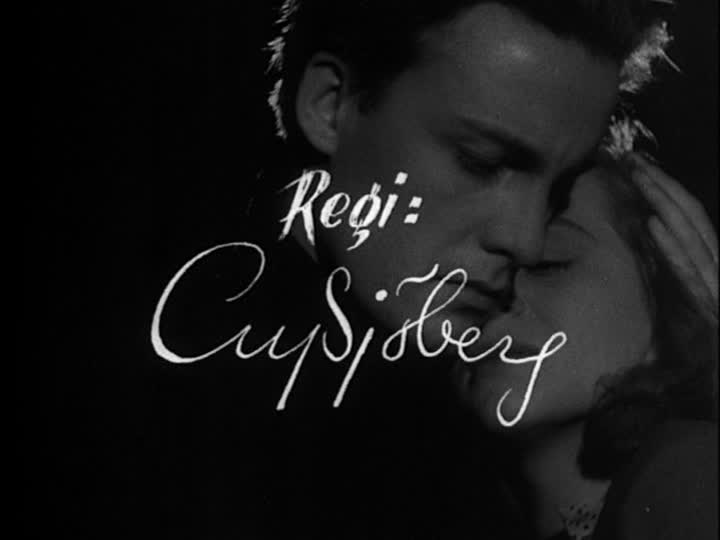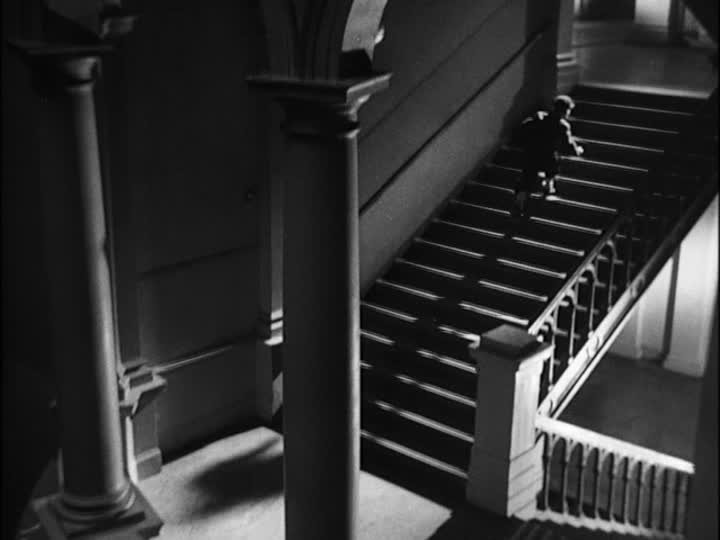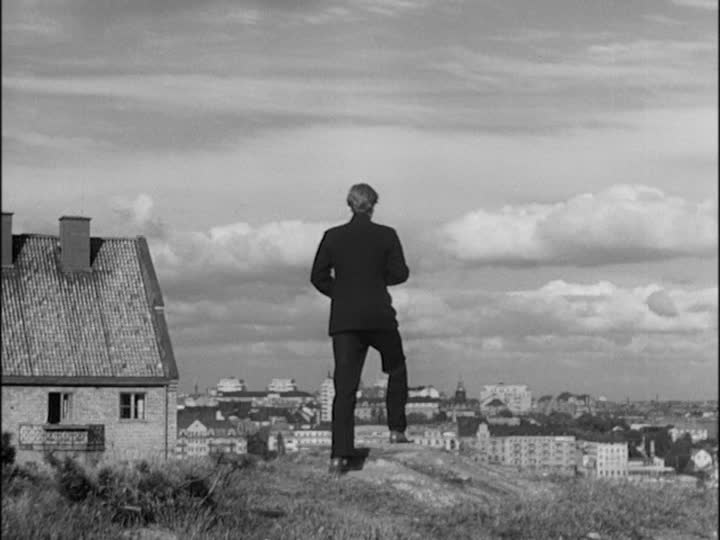The recent flurry of news stories dealing with the topic of bullying in schools could have made a plausible case that this week’s Eclipse review, Alf Sjöberg’s Torment, was chosen as a timely comment on this unfortunately perennial phenomenon. But that wouldn’t be accurate. For starters, the kind of bullying currently being discussed involves kids picking on each other, whereas in Torment, the Swedish high school students are all pretty unified and supportive of each other; the main bully, and their common adversary, is their tyrannical Latin teacher, about whom I’ll have more to say shortly. But the main reason I chose this film is simply that it comes from the very last set I have left to write about here in my weekly column. It’s Film #1 from Eclipse Series 1: Early Bergman. Starting next week, I’m free to review any old film in the Eclipse Series that I haven’t already covered yet!


Now I know sharp-eyed readers will notice that Torment is directed by Alf Sjöberg (who also made Miss Julie, Criterion #416), so I’ll point out the reason this title was included in a box dedicated to the works of a young Ingmar Bergman is that he wrote the screenplay and served as Assistant Director (which is to say, he shot the last scene when a late change to the movie’s conclusion was needed and Sjöberg was already busy working on a different production.) Anyone familiar with Bergman’s classic works of the 50s, 60s and 70s will quickly pick up on several of Bergman’s characteristic themes and motifs.
Dissatisfaction with repressive social proprieties, the presumptions of religious authorities and the persistent desire to break away from the grim stoic boundaries on personal expression erected by one’s elders are all spelled out by his actors in a formulaic, apprentice-like way but still commendable on the merits. A prototypical young writer’s story, based on events and settings deeply familiar to its writer, Torment illustrates the plight of a senior-year student, Jan-Erik Widgren, as he endures not merely one but several torments in the weeks leading up to his final exams and graduation date. The Swedish title, Hets, may already imply multiple afflictions – I don’t really know my Scandinavian grammar too well – but “Torments” would have been a clunky title in any case.


The film opens with an expressionistic, God’s-eye level shot of a young child running across open space, apparently late for his class and seeking to evade capture from a hypervigilant schoolmaster who scans the corridors continually on the lookout for stragglers.
It’s one of several scenes that struck me as mildly creepy and brought to mind the atmosphere of Fritz Lang’s M, shot over a decade earlier but presumably quite influential on northern European films of this era. From there, we swiftly enter a morning chapel service, where the high elevation shots continue, allowing us to observe the students as they go through their compulsory motions to start the day, their minds diverted in every direction except heavenward.


Soon we’re in the Latin IV class, where a prowling jackal of a teacher, nicknamed Caligula by his long-suffering pupils, roams the classroom in search of the most vulnerable and uncertain scholars whom he can expose and humiliate for their lack of preparation and mastery. He runs a psychological torture-chamber that has the young men quivering with dread before class and cursing with hatred after its over.
Thrusting his pointed stick under the chins of students as they nervously translate obscure passages on the fly, Caligula serves as the archetype of fascist attitudes that still had their proponents in 1944, even as World War II was in its later stages and Nazi Germany’s defeat was appearing more and more inevitable. He’s the kind of guy who recognizes and ruthlessly exploits the powerful upper hand his position gives him over the lives of others, getting his sadistic kicks from absorbing the resentment and frustration he knows he provokes, yet which his students are fearfully powerless to openly express. Even if you can’t understand the Swedish (and Latin) language track (sorry, no subs), the voice tone and body language tell you everything you need to know about the dynamics of Caligula’s classroom:
Unfortunately for Widgren, home life doesn’t offer him much of a respite from the suffering he puts up with at school. His parents are prototypical bourgeoisie, the father dour and taciturn, speaking up only when there’s a scolding reprimand to be delivered, the mother a source of perpetual guilt and self-recrimination over all the disappointments he’s caused her.
Among his friends, Jan-Erik is able to relax a bit, but they’re all coping under the same pressures in their own way, Petersson a trembling bundle of nerves, Sandman a callow lowlife who defends his misogyny by quoting Strindberg and Nietzsche. A sensitive and perceptive type, Widgren has no problems with them but nurtures his own sense of idealism in the face of all the pressures coming down that seem intent on crushing him.


Late one evening, Widgren spots Bertha, a pretty girl staggering drunkenly down the street. He’s met her before, at a tobacco shop where she works and where he’s still too young to partake of the merchandise, though that doesn’t stop him from trying. At first simply intent on being a chivalrous gentleman to a young woman at risk of trouble, he escorts her home.
Bertha takes a liking to him, sensing his naivete, and turns on the tears as she runs emotional rings around him that overwhelm his intentions to get home quickly so he can finish his homework and get ready for school the next morning. Sure enough, they fall into each others arms, and that night the boy, as they say, becomes a man.


But as these things often go, the complications quickly mount, twisting and turning in directions that Widgren never could have anticipated. Bertha, who lives alone, has her own share of torments to deal with, which chiefly consist of unwanted late-night visits from an anonymous old pervert who lurks outside her door, saying horrible things to her and generally messing with her mind. Widgren again assumes the role of her protector, enjoying her ready availability and the ego strokes of rescuing a damsel in distress, but discovers that staying in sync with her turbulent moodswings is quite a challenge – especially when she starts drinking.
You can easily imagine the toll all this drama takes on Widgren’s academic prowess, as his grades begin to suffer, his late night carousing draws the ire of his parents and the plan of what he intends for his life crumbles under the weight of his ever-growing apathy and contempt for the oppressive systems of school, family, religion and social obligation he was born into. The various streams of conflict converge and erupt as Widgren withstands the crisis, wrestles through his choices and ultimately embarks on a new life riddled with uncertainty but through sheer determination, still full of promise.


Sound familiar? I suppose it does, since these kinds of coming-of-age stories provide an endless stock of material for young artists, whether their chosen media is film, literature or even song. The final scene, directed by Bergman as mentioned above, showing Widgren as he steps toward the horizon and the great big world beyond the provincial inhibitions of his hometown, feels similar to Fellini’s I Vitteloni where we see its protagonist, representing the director, leaving home for good via the train. The obvious autobiographical elements of Ingmar Bergman’s life give Torment a special value to all who admire the director’s magnificent body of work.
Though I somewhat doubt that Bergman was ever involved in a plot quite as twisted and grim as the events that occur in Torment, it’s clear that the kind of miseries he endured in school, at home and over the course of his youth ultimately did serve a constructive purpose, in fueling his determination to express what those experiences meant to him. In that process, he created great art that continues to inspire millions in their own explorations of life’s meanings and mysteries. Though Ingmar himself has passed away, I’m glad his films live on to instruct those of us who’ve endured our own share of Torment that, as life goes on, it gets better.





